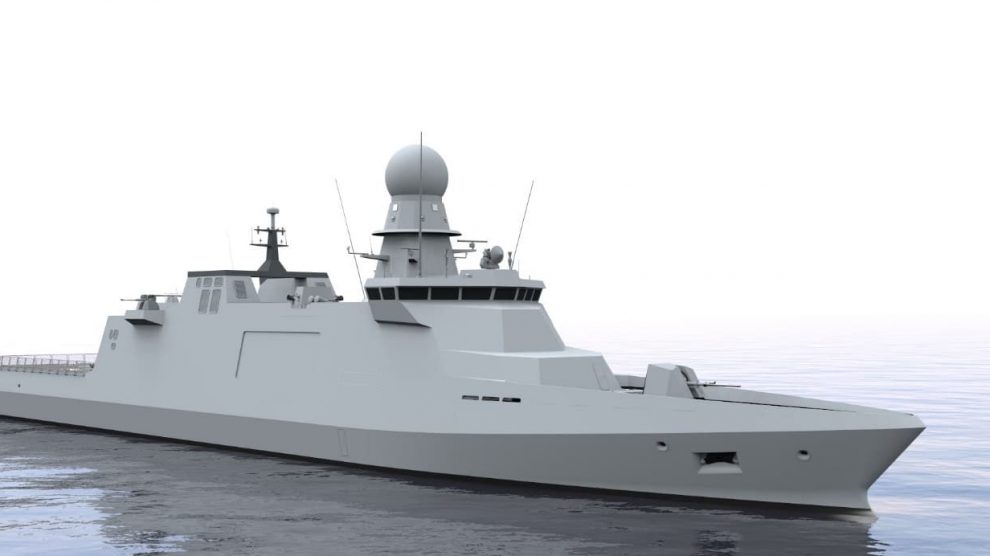Full steam ahead on the new European corvettes, one of the most critical shared defence programmes. On December 9 the Naviris-coordinated consortium of Fincantieri, Naval Group and Navantia submitted a proposal for the Modular Multirole Patrol Corvette (MMPC) tender of the European Defence Fund (EDF).
Naviris, a joint venture of two major shipbuilders – Italy’s Fincantieri and France’s Naval Group – is reinforcing its collaboration over the MMPC programme and reaffirming its desire to work in synergy to develop a joint naval defence capability in Europe.
According to Fincantieri’s press release, the companies believe “this is the right time to start a real, concrete, added-value collaboration”. The latter will take the form of Europe’s first joint naval defence capability.
The strategic programme already existed in the context of the EU’s Permanent Structured Cooperation framework (PESCO) in the guise of its most important naval initiative: the European Patrol Corvette (EPC).
“The right moment”
On today’s geopolitical front, the EU is faced with multiple threats on different fronts, such as rising tensions between major powers and the climate emergency, illegal migration and terrorism, to name but a few.
In response, several member states have stressed the need to address these challenges by developing common military capabilities. In 2021 an increasing number of European countries have been asked to take responsibility for their own security, to be developed both within the framework of the Atlantic Alliance and as an integral part of the common European security and defence policy.
Recognising the need for ever greater collaboration, the consortium bringing together the three industrial players will support the European Union in the field of naval defence.
The proposal
The proposal put forward by the consortium aims to maximise the synergy between European shipbuilding industries in an attempt to “ensure a European sovereignty in the second rank warship”.
The new EPC unit is set to give new impetus to the PESCO project. Last February, Naviris had signed a memorandum on the subject with the Spanish champion, Navantia, aligning the possible industrial grouping perfectly with the requirements to access EDF funding. Four different countries are involved (Italy, France, Spain and Greece), plus Denmark and Norway for co-financing.
A European effort
The three shipbuilding industries, coordinated by Naviris, will also rely on 40 companies that deal with naval systems and components. The proposal is a crucial step in preparing for the next production of a prototype unit, should a second EDF call be issued as part of the multiannual planning.
Thanks to the programme’s promotion across several European navies, and the joint action of CEPOL countries, this project will further strengthen the EU’s industry and reduce duplication of defence spending.
The European Patrol Corvette
The ECP is based on a unified framework of standards and advanced collaborative methodologies in the field of engineering. It is part of the European Defence Policy, one of the instruments already provided for in the EU treaties and among the main mechanisms forming the foundation of renewed ambitions for a shared defence system.
The French and Italian naval personnel had already begun joint studies regarding the common operational need for multi-role and patrol missions units. That highlighted the need for a smart, innovative, affordable, sustainable, inter-operational and flexible ship.
The project officially entered PESCO in October 2019 under Italian leadership and with the immediate accession of France. After that, Greece and Spain joined in too, while Portugal is currently on board as an observer.
Future developments
Together with the EDA, all companies met on October 6 for the first operational meeting on the project and gave the go-ahead to design two corvette versions. One is best suited for the needs of Italy and Greece (in the wider Mediterranean), and the other is intended for France and Spain, which look at overseas territories.
The aim is to develop European corvettes in the shortest possible time (the first prototype should arrive in 2027), starting with definition studies and ending with design. It will also feature an innovative design compared to existing units, as it is modular and flexible. The EPC will be more energy-efficient, safer, more interoperable and more attentive to the security of the fifth operational domain, cyberspace.





